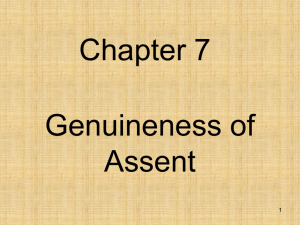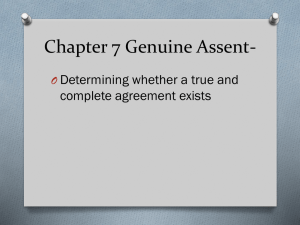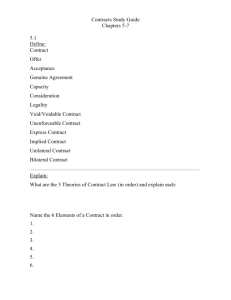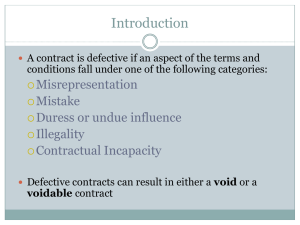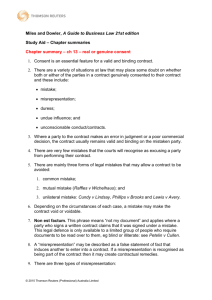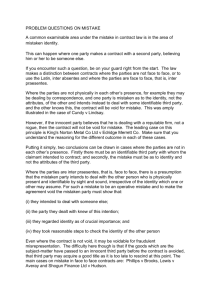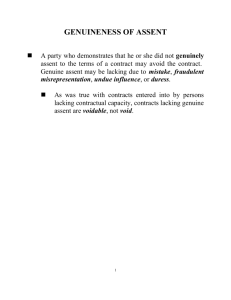4. Void and voidable contracts a) Overview
advertisement
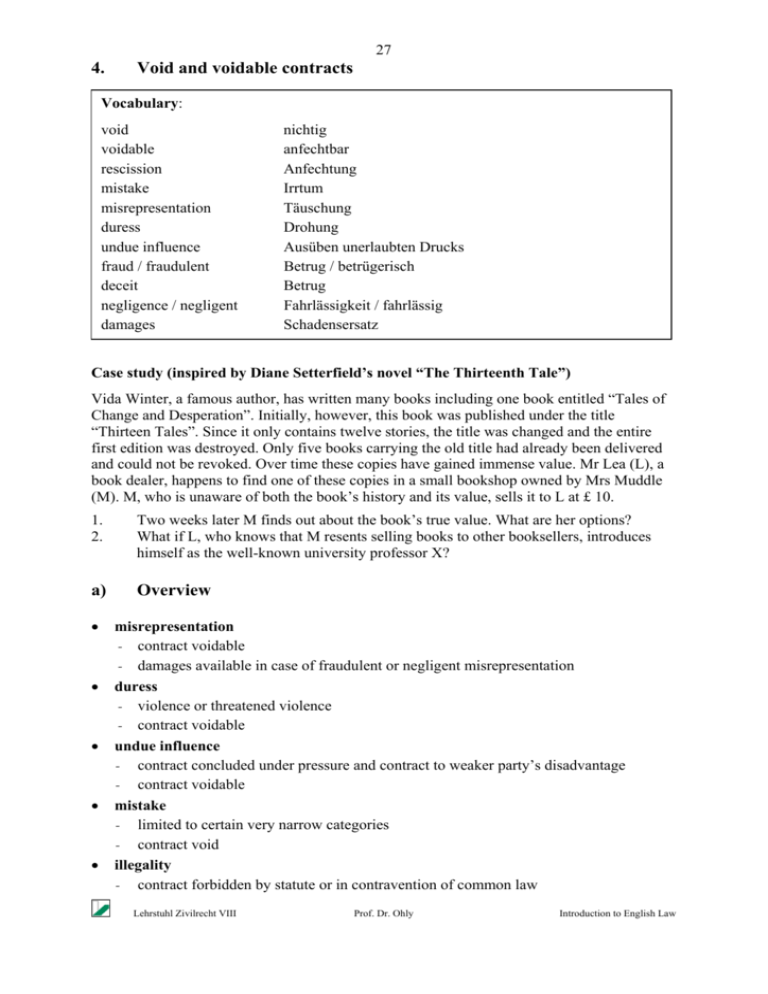
27 4. Void and voidable contracts Vocabulary: void voidable rescission mistake misrepresentation duress undue influence fraud / fraudulent deceit negligence / negligent damages nichtig anfechtbar Anfechtung Irrtum Täuschung Drohung Ausüben unerlaubten Drucks Betrug / betrügerisch Betrug Fahrlässigkeit / fahrlässig Schadensersatz Case study (inspired by Diane Setterfield’s novel “The Thirteenth Tale”) Vida Winter, a famous author, has written many books including one book entitled “Tales of Change and Desperation”. Initially, however, this book was published under the title “Thirteen Tales”. Since it only contains twelve stories, the title was changed and the entire first edition was destroyed. Only five books carrying the old title had already been delivered and could not be revoked. Over time these copies have gained immense value. Mr Lea (L), a book dealer, happens to find one of these copies in a small bookshop owned by Mrs Muddle (M). M, who is unaware of both the book’s history and its value, sells it to L at £ 10. 1. 2. Two weeks later M finds out about the book’s true value. What are her options? What if L, who knows that M resents selling books to other booksellers, introduces himself as the well-known university professor X? a) Overview • • • • • misrepresentation - contract voidable - damages available in case of fraudulent or negligent misrepresentation duress - violence or threatened violence - contract voidable undue influence - contract concluded under pressure and contract to weaker party’s disadvantage - contract voidable mistake - limited to certain very narrow categories - contract void illegality - contract forbidden by statute or in contravention of common law Lehrstuhl Zivilrecht VIII Prof. Dr. Ohly Introduction to English Law 28 - b) contract void Misrepresentation Misrepresentation • • • • • • Misrepresentation = false statement of an existing fact made by one party of a contract (representor) to the other (representee) before or at the time of contracting on which that other party relied in contracting. The representation must be one of fact rather than a statement of opinion. Example (Bisset v Wilkinson [1927] AC 177): statement that certain lands in New Zealand would carry 2,000 sheep is a mere statement of opinion if the representee has never carried out sheep-farming there before. The statement must concern an existing fact rather than future conduct or intention. An intentional lie about a present intention, however, can amount to a misrepresentation (Bowen LJ: “A statement about a man’s mind is as much a statement of fact as the state of his digestion”). The former distinction between mistakes of fact and mistakes of law has been abolished by the House of Lords in Kleinwort Benson v Lincoln City Council [1992] 2 AC 349 and Deutsche Morgan Greenfell Group v IRC [2006] UKHL 49, consequently false representations of law are also actionable. Mere exaggerated advertisements ("puffs") do not normally amount to a representation. Example (according to Anson’s Law of Contract, 28th ed, p 239: “This perfume will irresistibly attract members of the opposite sex.”) Misrepresentation can be by conduct, implied misrepresentation, R v Barnard (1837): Oxford shop gave discount to students, D entered the shop wearing the cap and gown of a student. Spice Girls Ltd v Aprilia World Service Silence generally does not constitute a misrepresentation (Turner v Green [1895] 2 Ch 205) No general duty to disclose. Each party is responsible for acquiring its own information. The common law insists that good deals should go to the more intelligent or hard-working. Exceptions: partial non-disclosure change of circumstances, see With v O'Flanagan [1936] Ch 575: Sale of medical practice which had produced an income of £ 2,000 p.a., seller withheld information that income had sunk dramatically immediately prior to conclusion of contract. fiduciary or confidential relationships contracts uberrimae fidei (contracts of the utmost good faith), e.g. contracts of insurance The person making the representation must be a party to the contract, exception: agency The misrepresentation must be addressed to the party misled. Lehrstuhl Zivilrecht VIII Prof. Dr. Ohly Introduction to English Law • 29 representation. This is not the case if The other party must have relied on the the other party knew the truth or placed no importance on the representation. Consequences of a misrepresentation • • rescission A misrepresentation renders the contract voidable at the option of the representee. Where a contract is rescinded it is terminated ab initio. The representee can resist the representor’s action for specific performance or damages and rescind by way of counterclaim. Rescission is barred in 4 situations: (1) restitution in integrum is not possible, (2) effect on third party rights: no rescission in order to reclaim goods from a bona fide purchaser, (3) affirmation, (4) lapse of time. damages: English law distinguishes between 4 categories: fraudulent misrepresentation: made (a) knowingly or (b) without believing in its truth or (c) recklessly, (ie representor does not care whether the statement is true or false) Damages are available under the tort of deceit. negligent misrepresentation: if (1) the damage forseeable, (2) the representor and representee proximate, (3) the imposition of a special relationship ‘fair, just and reasonable’ Damages are available under tort of negligence, see Caparo Industries v Dickman [1990] 2 AC 605 (see below, III) misrepresentation coming within s 2(1) Misrepresentation Act 1967: situation similar to negligent misrepresentation, but reversal of burden of proof. wholly innocent misrepresentations: no damages unless awarded in lieu of rescission (s 2 (2) Misrepresentation Act) c) Duress and undue influence Duress • • • • Three-stage-test (see DSND Subsea Ltd v Petroleum Geo-Services ASA): (1) pressure effecting compulsion on or a lack of practical choice for the victim (2) which is illegitimate and (3) which is a significant cause inducing the claimant to enter into the contract. Duress must be operative, ie conclusion of contract must have been caused by the duress. Determination by the “but for”-test: But for the threat, would the threatened person have concluded the contract? examples: threats to the person, see Barton v Armstrong [1976] AC 104: gun held to head of threatened person economic duress, examples: Atlas Express v Kafco [1989] 1 All ER 641: threat of non-performance of a vitally important contract, The Evia Luck [1992] 2 AC 152: threat by trade union to black (i.e. not to load or unload) a ship Consequence: contract voidable at the option of the person put under duress Lehrstuhl Zivilrecht VIII Prof. Dr. Ohly Introduction to English Law 30 Undue influence • • • • • • • d) • • Equitable doctrine developed as a consequence of the narrow scope of the doctrine of duress. Undue influence exists when one party’s decision making has been undermined by the other party. Category 1: relationship of dependency or dominion, see Bank of Credit and Commerce International SA v Aboody [1989] 1 QB 923 Category 2: fiduciary or confidential relationship Lloyds Bank v Bundy [1974] 3 All ER 757: Bank manager advises elderly farmer without any business experience to agree to guarantees. Lord Denning MR: Contract voidable on two bases: (1) undue influence, (2) inequality of bargaining power. National Westminster Bank plc v Morgan [1985] 1 All ER 821: doctrine of "inequality of bargaining power" rejected by House of Lords, two elements of undue influence: (1) fiduciary relationship where one party exercises dominance, (2) transaction disadvantageous to weaker party Influence exerted by a third party is operative if (1) third party acts as contracting party’s agent or (2) contracting party has actual or constructive notice of the facts giving rise to the claim (see Barclays Bank Plc v O’Brien [1994] 1 AC 180) Where wife offers surety for her husband’s debts there is no presumption that the contract is voidable. But the bank is under an obligation to take reasonable precautions, see Royal Bank of Scotland Plc v. Etridge (No 2) [2002] 2 AC 773 Consequence: Contract voidable Mistake General observations: - Mistakes are only operative in very few and limited situations. Contracting parties who have made a unilateral mistake are treated much more generously by German law (no equivalent to § 119 BGB in English law). - The question whether one party induced the other party's mistake is of much greater importance in English than in German law. - English law treats some cases as instances of mistake whereas German law would classify them as cases of "Unmöglichkeit" or "Wegfall der Geschäftsgrundlage". Background: Strict common law rule that operative (= legally effective) mistake renders contract void ab initio. Problem: Effect on third party rights. Lehrstuhl Zivilrecht VIII Prof. Dr. Ohly Introduction to English Law 31 - • • Result: narrow approach to mistakes – (1) The law is concerned with the conduct rather than with the will of the parties and the courts tend to regard a contact as valid if offer and acceptance are unambiguous. (2) Generally parties are bound by their apparent agreements in the interests of certainty and commercial convenience. Equity may intervene to mitigate the harshness of common law. A mistake my have two possible effects: It may destroy consensus or it may render the contract void. Agreement mistake I: Mistake as to the identity of other party • • • • • Mistake as to the identity of the other party renders contract void if (1) mistake concerns identity of the other party rather than his/her attributes and (2) identity of other party is regarded as crucial. Background: s 21 Sale of Goods Act 1979 (nemo dat quod non habet). The authorities are not without inconsistencies, see Cundy v Lindsay (1878) 3 App Cas 459 Phillips v Brooks Ltd [1919] KB 243 Ingram v Little [1961] 1 QB 31 Lewis v Averay [1972] 1 QB 198 House of Lord’s decision in Shogun Finance Ltd v Hudson: Majority view: distinction between contracts “inter praesentes” and “inter absentes”, written contract concluded between parties mentioned in document (see parole evidence rule). Contract signed by a fraudster under another name: no contract, because the crook himself has not become a party to the contract and because he was not the agent of the party mentioned. Minority view: no distinction, generalisation of rule in Lewis v Averay, presumption to the effect that contract is to be concluded with person with whom contracting party has physically dealt. Fraud does not concern the formation of the contract, but only renders the contract voidable. Further reading: Hare [2004] MLR 993 In fact these cases do not concern “mistakes”, they rather relate to offer and acceptance: the “mistake”, where operative, excludes a “consensus ad idem” because both parties are at cross-purposes as to who the partners of the contract are. Agreement mistake II: Mistake as to the terms or the subject-matter of a contract: • Contract void if parties at cross-purposes, ie if they differ as to what the contract is about. • Example: Raffles v Wichelhaus (1864) 2 H & C 906, contract for sale of a consignment of cotton which was to arrive "ex Peerless" from Bombay held void, because two ships named "Peerless" were due to arrive and one party had intended to buy the earlier load whereas the other party intended to sell the later one. Lehrstuhl Zivilrecht VIII Prof. Dr. Ohly Introduction to English Law • 32 agreement was reached at all. Arguably In these cases one might ask whether an these cases should be resolved under the rules concerning offer and acceptance. However, they are generally seen as cases of mistake in English law. Documents signed by mistake: • Defence of "non est factum" ("I did not make it."): (a) defendant has been mislead by claimant as to the nature of the signed document, (b) defendant has exercised proper care for his own protection • Examples: − Thoroughgood's Case (1582) − Saunders v Anglia Building Society [1971] AC 1004 Common mistake • - • Mistake as to the existence of subject matter: Contract void if subject-matter does not (or no longer) exist unless one of the parties has guaranteed its existence. Couturier v Hastie (1856) 5 HL Cas 673: Contract void if goods had already been sold when contract was concluded. s 6 Sale of Goods Act 1979 but see McRae v Commonwealth Disposals Commission (1951) 84 CLR 377 Mistake as to the quality of the subject-matter: Contract valid unless mistake (a) is common to both parties, (b) concerns a fact fundamental to the bargain and (c) the mistake makes the contract "essentially and radically different from that which the parties believed to exist" Bell v Lever Bros [1932] AC 161 Leaf v International Galleries [1950] 2 KB 86: sale of a painting falsely believed by both parties to be the work of John Constable is valid since the buyer intended to buy this very picture. Associated Japanese Bank (Int.) v Crédit du Nord SA [1988] 3 All ER 902: Common mistake may make contract void if wholly exceptional circumstances, mistake of both parties existing at time of contracting, mistake must render contract "essentially and radically different from that which the parties believed to exist". Intervention of equity Common mistake my make the contract liable to be set aside in equity, see Solle v Butcher [1950] 1 KB 671: Both parties mistakenly believed that a flat was no longer rent controlled when in fact it was. Lease liable to be set aside on the condition that landlord would sign a new lease. But Solle v Butcher recently regarded as per incuriam in “The Great Peace”, [2002] 4 All ER 689: common mistake only renders the contract void in the narrow categories accepted in Bell v Lever Bros, Solle v Butcher inconsistent with the decision in Bell v Lever Bros, which was binding on the Court of Appeal. Lehrstuhl Zivilrecht VIII Prof. Dr. Ohly Introduction to English Law 33 e) Illegality Contracts can be declared void by statute or can be illegal under common law • • • example of contracts declared void by statute: discriminatory contracts (Race Relations Act 1976, Sex Discrimination Act 1975) example of contracts illegal under common law: contracts in restraint of trade Consequences - contract void and unenforceable by either party - Money or property transferred is not recoverable - doctrine of severance: At least in cases of restraint of trade the unreasonable part can be separated from the reasonable one. Lehrstuhl Zivilrecht VIII Prof. Dr. Ohly Introduction to English Law


